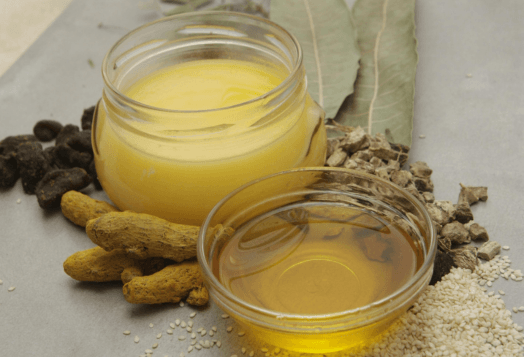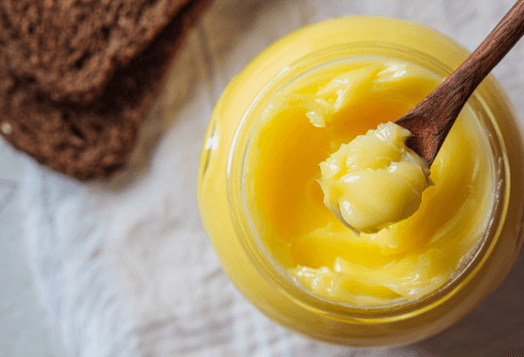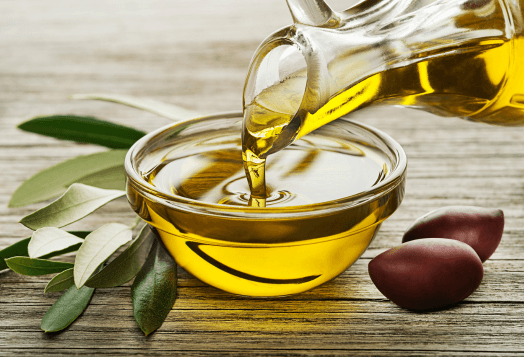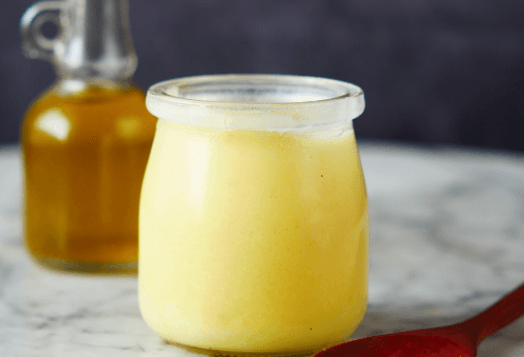
Stuck between ghee and olive oil? Your choice of cooking fat matters more than you think. This quick guide to ghee vs olive oil breaks down their nutrition, health benefits, and cooking tips, helping you figure out what’s best for your heart, waistline, and everyday meals.
What is Ghee?

If you grew up in an Indian kitchen, the aroma of sizzling ghee is unforgettable. But ghee is more than just a flavour powerhouse; it’s a nutrient-rich cooking fat with centuries of culinary and medicinal use, often compared to refined oil for heart health. Let’s break down what makes ghee special.
1. Traditional Preparation
Ghee is made by slowly simmering unsalted butter to separate water and milk solids, leaving behind a golden, nutty fat. This clarification process not only enhances flavour but also gives ghee a high smoke point (~250°C), making it ideal for frying, roasting, or sautéing without breaking down into harmful compounds.
2. Nutritional Profile of Ghee
Ghee is rich in saturated fats, which provide a concentrated energy source. It also contains fat-soluble vitamins A, D, E, and K, along with antioxidants and conjugated linoleic acid (CLA), which may support metabolism and immunity.
3. Health Benefits of Ghee
Ghee supports digestion with butyrate, which promotes gut health and reduces inflammation
It provides lasting energy as a concentrated source of healthy fat
Ghee fights free radicals to support cellular health
It adds a rich, nutty flavour while staying heart-friendly in moderation
What is Olive Oil?

Olive oil is the liquid gold of the Mediterranean diet, celebrated for its heart-friendly fats and rich flavour. Beyond its culinary uses, it’s packed with nutrients that support overall wellness and help keep your heart healthy. Let’s dive into what makes olive oil a staple in kitchens worldwide.
1. Types of Olive Oil
Olive oil comes in several varieties, each suited to different uses:
Extra Virgin Olive Oil (EVOO) – cold-pressed, unrefined, and nutrient-rich, ideal for salads and drizzling
Virgin Olive Oil – slightly refined but retains most nutrients and flavour
Refined Olive Oil – heat-treated, lower in antioxidants, better for high-heat cooking
Cold-Pressed Olive Oil – retains maximum nutrients and polyphenols for health benefits.
2. Nutritional Profile of Olive Oil
Olive oil is rich in monounsaturated fats, polyphenols, and antioxidants. It contains vitamin E and other compounds that support heart health, reduce oxidative stress, and improve overall metabolic balance.
3. Health Benefits of Olive Oil
Olive oil supports heart health by lowering LDL cholesterol and maintaining HDL cholesterol
It helps with weight management by keeping you fuller and supporting a healthy metabolism
Olive oil has anti-inflammatory properties thanks to polyphenols that reduce inflammation in the body
It adds a smooth, fruity flavour while keeping meals nutrient-rich and heart-friendly
Desi Ghee vs Olive Oil Nutritional Comparison for Weight Loss and Heart Health
This table compares desi ghee vs olive oil, covering fats, vitamins, heart benefits, cooking uses, and flavour so you can cook smarter, choose the best oil for your heart, and eat healthier without compromising taste.
Aspect | Ghee | Olive Oil |
Fat Content | High in saturated fats, which can raise LDL (“bad”) cholesterol if eaten too much | Rich in monounsaturated fats, which are heart-friendly and help lower bad cholesterol |
Vitamins & Antioxidants | Contains vitamins A, D, E, K and CLA, plus antioxidants that support overall health | Contains vitamin E, polyphenols, and anti-inflammatory compounds that protect the heart and reduce inflammation |
Impact on Heart Health | Moderate use may fit in a balanced diet; saturated fats can raise cholesterol | Supports cardiovascular health, lowers LDL, and maintains HDL (“good”) cholesterol |
Weight Management | High-calorie saturated fats may make weight loss harder if overused | High-calorie monounsaturated fats keep you full longer and can support weight management |
Cooking Versatility | High smoke point (~250°C) makes it ideal for frying, roasting, and sautéing | Medium smoke point (~190°C for EVOO), best for salads, drizzling, and light cooking |
flavour Profile | Nutty, rich, traditional Indian taste | Fruity, mild, Mediterranean-style taste |
Ghee brings the nutty, high-heat magic to your pan, while olive oil packs heart-friendly, anti-inflammatory power. Knowing the strengths of ghee vs olive oil means you can mix, match, and master your meals for both flavour and wellness.
Ghee vs Olive Oil: What to Use for Healthier Meals

1. High-Temperature Cooking
Ghee is your go-to when cooking at high temperatures, especially when compared to other cooking oils for health benefits. With a smoke point around 250°C, it’s perfect for frying, roasting, or sautéing without losing its nutrients. Think crispy Indian-style stir-fries, deep-fried snacks, or golden roasted veggies. If you’re wondering ghee or olive oil for frying, ghee clearly wins here.
2. Low to Medium Heat & Dressings
Olive oil shines in low-to-medium-heat dishes or as a finishing touch. Drizzle extra virgin olive oil over salads, pasta, or cooked vegetables. Light sautéing works too. Using olive oil this way preserves its monounsaturated fats and antioxidants, making it a heart-friendly option. For those asking is olive oil is better than ghee, this is where it truly stands out.
3. Combining Both Oils
Can’t choose? Why not use both? Cook with ghee for flavour and heat tolerance, then drizzle olive oil for a fresh taste and extra health benefits. It’s perfect for roasted veggies, Indian curries, or stir-fries, giving you the best of ghee vs olive oil flavour and heart health in one.
4. Extra Practical Tips
Timing matters, so add olive oil at the end to retain its nutrients and aroma
Both oils are calorie-dense, so a little goes a long way.
Experiment with flavours; try mixing ghee and olive oil to balance richness and freshnessMatch your cuisine by using ghee for traditional Indian recipes and olive oil for Mediterranean-style dishes
Keep ghee at room temperature and olive oil in a cool, dark place to maintain quality
Now You Can Decide Between Ghee vs Olive Oil

Now that you know the differences between ghee vs olive oil, you can make informed choices in the kitchen. Use ghee for rich, high-heat cooking and olive oil for heart-friendly, antioxidant-packed meals, or combine both for the best of flavour and wellness. For personalised advice on choosing the right oils for your health and lifestyle, Pyng’s certified nutritionists and wellness coaches are here to guide you.




